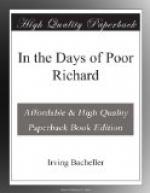“So’m I,” said the Captain. “This ‘ere man had a good recommend an’ said he could cook perfect.”
“A man like that kin cook the passengers with their own heat,” said Solomon. “I feel like my belly was full o’ hot rocks. If you’ll let me into the galley, I’ll right ye up an’ shift the way o’ the wind an’ the course o’ the ship. I’ll swing the bow toward Heaven ‘stead o’ Hell an’ keep her p’inted straight an’ it won’t cost ye a penny. They’s too much swearin’ on this ’ere ship. Can’t nobody be a Christian with his guts a-b’ilin’. His tongue’ll break loose an’ make his soul look like a waggin with a smashed wheel an’ a bu’sted ex. A cook could do more good here than a minister.”
“Can you cook?”
“You try me an’ I’ll agree to happy ye up so ye won’t know yerself. Yer meat won’t be raw ner petrified an’ there won’t be no insecks in the biscuit.”
“He’ll make a row.”
“I hope so. Leave him to me. I’m a leetle bit in need o’ exercise, but ye needn’t worry. I know how to manage him—perfect. You come with me to the galley an’ tell him to git out of it. I’ll do the rest.”
Solomon’s advice was complied with. The cook—Thomas Crowpot by name—was ordered out of the galley. The sea cook is said to be the father of profanity. His reputation has come down through the ages untarnished, it would seem, by any example of philosophical moderation. Perhaps it is because, in the old days, his calling was a hard one and only those of a singular recklessness were willing to engage in it. The Snow’s cook was no exception. He was a big, brawny, black Yankee with a claw foot look in his eyes. Profanity whizzed through the open door like buckshot from a musket. He had been engaged for the voyage and would not give up his job to any man.
“Don’t be so snappish,” said Solomon. Turning to the Captain he added: “Don’t ye see here’s the big spring. This ’ere man could blister a bull’s heel by talkin’ to it. He’s hidin’ his candle. This ain’t no job fer him. I say he orto be promoted.”
With an outburst still profane but distinctly milder the cook wished to know what they meant.
Solomon squinted with his rifle eye as if he were taking careful aim at a small mark.
“Why, ye see we passengers have been swearin’ stiddy fer a week,” he drawled. “We’re wore out. We need a rest. You’re a trained swearer. Ye do it perfect. Ye ortn’t to have nothin’ else to do. We want you to go for’ard an’ find a comf’table place an’ set down an’ do all the swearin’ fer the hull ship from now on. You’ll git yer pay jest the same as if ye done the cookin’. It’s a big job but I guess ye’re ekal to it. I’ll agree that they won’t nobody try to grab it. Ye may have a little help afore the mast but none abaft.”
This unexpected proposition calmed the cook. The prospect of full pay and nothing to do pleased him. He surrendered.




